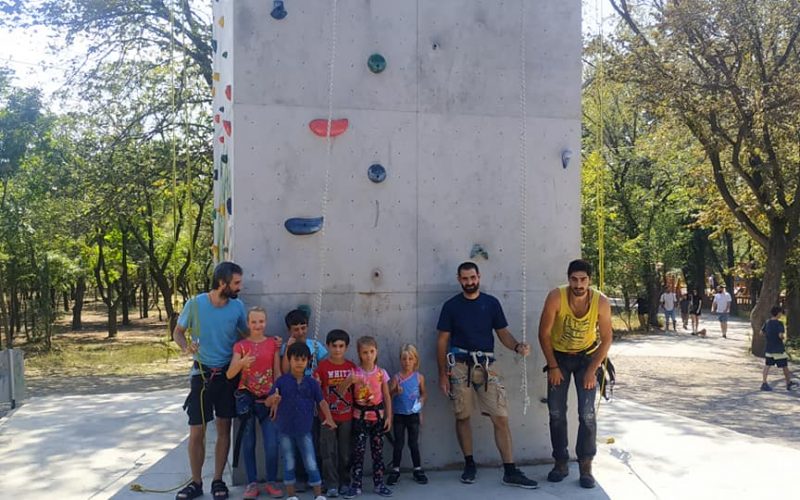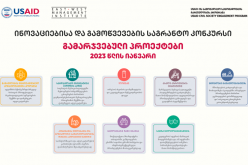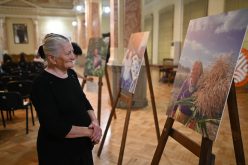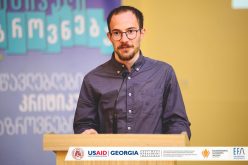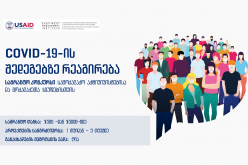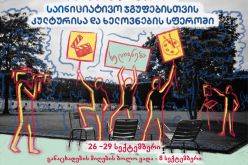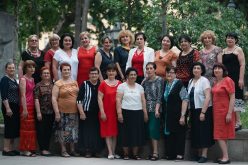Want to organize a rock-climbing club for orphaned children? Or build a park where local kids can play? USAID, through the ACCESS Program, is partnering with Orbeliani Meti to help people use crowdfunding to collect small donations and make big things happen.
For Lazare Komakhidze, rock climbing has been a crucial part of life since childhood. Komakhidze grew up in Dzegvi, a small village where his mother worked at the orphanage. He remembers it as one of those places that can seem boring at times, and where residents don’t have much to look forward to. But when a young man came from outside the village to establish a rock-climbing club, Komakhidze was hooked. He now had a hobby, and a purpose.
Fast forward a few years and Komakhidze is now a professional climber. He felt he needed to give back to the community – to give other kids a purpose. He set up a rock-climbing club in Bediani, a village where he lived afterwards. “These children are forgotten by society,” says Komakhidze, “they have nothing.”
 Finding money to build a climbing wall was not easy. Then, he found out about Orbeliani Meti, an online crowdfunding platform where the money raised by local contributors is matched by international donors.
Finding money to build a climbing wall was not easy. Then, he found out about Orbeliani Meti, an online crowdfunding platform where the money raised by local contributors is matched by international donors.
“We felt that everybody should be able to take action, to do something good, whatever they feel is important for their community,” says Ketevan Khachidze, program director at Orbeliani-Georgia. She explains that not everyone has the ability to set up an NGO to receive donor funding and not everyone knows how to raise money elsewhere. “It can be quite daunting.”
Orbeliani-Georgia has operated since 2014, supporting people with great ideas to get the funding they need to take positive action in their communities. It has set out to “revolutionize” aid by changing how people obtain the resources to improve their communities. In July 2020, they launched their crowdfunding platform.
This is how the platform works: anyone who wants to make their community thrive can submit an idea to the Orbeliani Meti platform. It is then up to them to raise the funds needed, like on any crowdfunding platform. The difference here is that USAID (through its ACCESS program implemented by the East-West Management Institute) has matched 50% of the funds raised by 12 projects through Orbeliani Meti. This combination of feeling ownership over the project, but also being recognized for your efforts and receiving co-funding from international donor organizations is what made this project a success, Khachidze says.
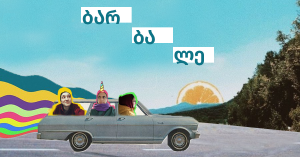
Ride-Sharing App for Women
Once they register their ideas on the online platform, Orbeliani-Georgia works closely with the civic activists and citizen groups helping them craft outreach campaigns, develop multimedia products, and implement media campaigns. This knowledge and experience help civic activists and citizen groups during and beyond the Orbeliani-funded initiatives. And it is mostly informal and less experienced groups – those who often do not meet traditional donors’ criteria – and have limited opportunities to raise funds for their civic initiatives. These initiatives range from a ride-share app for women in order to connect those who are looking for rides with those who can offer rides and are looking for passengers, to reviving a park in the village Okami, to setting up food banks for the poor, to saving endangered bird species, to reviving tourism through documenting the centuries-old wooden houses, to organizing summer camps to instill leadership skills in young women, etc.
Several crowdfunding projects have been piloted in Georgia before Orbeliani Meti. Some were successful, but many failed. “It’s quite a new thing for Georgia, and people do not have experience of fundraising,” Khachidze explains. But, Orbeliani-Georgia believes that giving people a space to fundraise for initiatives in their communities is beginning to make a major difference.
 High up in the mountains of Adjara, in the village Pachkha, hours from the nearest city Batumi, Asmat has been actively trying to create a community that works hard to make their lives better. They have initiated several different projects, but building a playground for the kids with Orbeliani’s support may have been the most successful one. Not because they made the playground, but because so many people got involved to get it off the ground.
High up in the mountains of Adjara, in the village Pachkha, hours from the nearest city Batumi, Asmat has been actively trying to create a community that works hard to make their lives better. They have initiated several different projects, but building a playground for the kids with Orbeliani’s support may have been the most successful one. Not because they made the playground, but because so many people got involved to get it off the ground.
“It’s been incredibly rewarding to see that everyone cares, and everyone who chipped in a little bit of money, also started really caring about the project,” Asmat, who received no salary working on this project, explains. From strangers putting in money to community members campaigning in person and on social media, the crowdfunding aspect adds a whole different dimension to development initiatives.
Academic research suggests this is one of the powers of crowdfunding: “An element differentiating crowdfunding from traditional finance is the possibility for building a relationship with a large number of people,” Melina Moleskisl and Ines Alegre found. They mention that it “can help to generate awareness of the cause, more favorable word of mouth advertising, and even trust.”
This not only pertains to the fundraising phase, but also when the projects are being implemented, Khachidze says: “They consult with the community because they have paid for the project in part, and they feel more responsible to consult with them.” It adds a different dimension: from the people crowdfunding and implementing the projects being careful on how the money is spent and communicating all the little details with their communities, to other sponsors finding out about the projects and deciding to chip in, she explains.
In the case of Komakhidze’s rock climbing club, this has meant that the Ministry of Sports and Youth donated an additional 10K GEL for equipment to the project. They had found out about the project through the media. “The additional funds were not only extremely important in speeding up the project, but it also felt as a confirmation that what we’re doing is important,” Komakhidze, who works on his project on a volunteer basis, says about the Ministry’s donation.
When Orbeliani Meti surveyed the people submitting initiatives on their platform, they found that 40% of them had never received non-profit funding before. “They either didn’t know it existed or where to look for it, or they had been rejected because they were too inexperienced,” Khachidze says. But via Orbeliani Meti, they were able to successfully make the dreams for their communities a reality.



